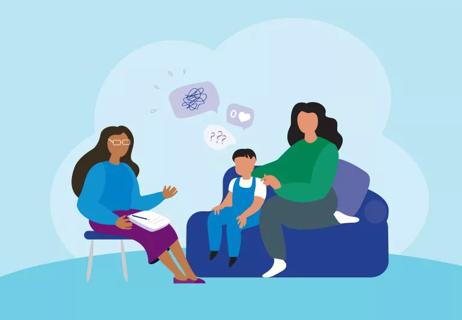Unexplained injuries, mood changes and sudden isolation may be signs your child needs help

Growing up brings challenges, especially during those awkward teenage years. Kids often go through an intense range of emotions as they desperately try to find their place in a complicated world.
Advertisement
Cleveland Clinic is a non-profit academic medical center. Advertising on our site helps support our mission. We do not endorse non-Cleveland Clinic products or services. Policy
The journey can be an excruciatingly painful one. It can get so bad that some teens try to dull the pain by inflicting a different kind of hurt — a physical hurt — upon themselves.
This self-harm can be done in many different ways, including cutting, scratching or burning. It’s far more common than you might expect, too: Studies show that nearly 1 in 5 teens have self-injured.
So, why does this happen and what can you do to help a teen showing the scars of psychological distress? Let’s look for answers with psychologist Kristen Eastman, PsyD, and psychiatrist Zeyd Khan, MD.
Video content: This video is available to watch online.
View video online (https://cdnapisec.kaltura.com/p/2207941/sp/220794100/playManifest/entryId/1_d9i9qk8o/flavorId/1_5f3sgelj/format/url/protocol/https/a.mp4)
Self-harm can come in many different forms, but many of these actions share a common connection: They leave visible marks. Common self-harming behaviors that create wounds include:
But seeing those signs of self-harm (nonsuicidal self-injury, or NSSI) isn’t always easy. “Kids are smart — and they know how to hide things,” says Dr. Khan. “They’ll take steps to conceal what they’re doing.”
Advertisement
They can do that by:
Other signs of self-harming could include:
Stress, anxiety and depression can all lead to self-harming behaviors with the right mix of factors. “These conditions may cause teens to feel out of control and at a loss with how to cope with their emotions,” notes Dr. Eastman. “Watch for emotional or behavioral changes.”
Self-harm sometimes begins after an adverse experience or event, says Dr. Khan. These could include:
Pay attention if your teen takes an interest in self-harm. That can include reading or watching videos about the behavior online or suddenly befriending others who engage in forms of self-injury, shares Dr. Eastman.
If your teen shuts themselves off from family and friends and begins spending more time alone than seems typical, the withdrawal could indicate depression and, in turn, signal a move toward self-harm.
Every individual sign noted here doesn’t always point to self-harm. Daily life for teens comes with ups and downs, as well as occasional mood changes, recognizes Dr. Eastman. Kids may have issues with friends from time to time, too, and they certainly stress over classes and tests.
But keep an eye out for a “constellation” of signs: “If you see a combination of these warning signs, particularly if they’re out of character for your teen, you should check in with them, keep a close eye and monitor,” she states.
Self-harm is often a misguided way of trying to cope with intense emotions.
“Those who self-harm often view it as a form of release or a distraction from emotional pain,” explains Dr. Eastman. “Some may feel emotionally numb and view self-harm as the only way they can feel anything.”
NSSI also may be a form of communication — a cry for help in the hope that others will see their pain through the injuries and respond.
It has long been estimated that about 20% of teens self-harm. But self-injury rates increased during the COVID-19 pandemic, and there’s some evidence the number may now be closer to 25%, according to Dr. Khan.
Advertisement
Dr. Khan says that self-injury is one of the strongest predictors of a future suicide attempt. Researchers say that 70% of those with a history of self-harming attempt suicide at least once; 55% make multiple attempts.
“Some have this escalating course of action because things are kept secret and they’re on their own,” he continues. “Because of that, they struggle to slow down or stop self-harming, which is more likely to lead down the road of suicidal thoughts.”
Learn more about teen suicide warning signs.
If you suspect that your teen is self-harming, or if they tell you that they are, it’s important not to react with anger or criticism. Validate their emotions and let them know you understand they’re feeling overwhelmed.
What your teen needs most at this moment is listening ears and compassion. “Be curious, not judgmental,” advises Dr. Khan. “Ask questions and try to listen more than you speak to find out what is happening.”
But make it clear that there are better ways to deal with their problems — and you’ll work with them to figure it out. Take steps to minimize access to sharp objects they may be using to self-harm, too, suggests Dr. Eastman.
If your child is self-harming, know that having a trusted, caring adult at their side is important for them to work through their emotions.
Advertisement
“Try your best to be that person,” encourages Dr. Khan.
It’s also important to quickly connect a child who is self-harming to a mental health professional. (If your child is having suicidal thoughts, head to an emergency room.)
Look for a mental health professional who has experience treating adolescents who self-harm. If you’re not sure where to start, talk to your pediatrician first. They can work with you to take the next step.
Other resources include the:
“It’s distressing to learn that your child has been self-harming,” Dr. Eastman empathizes. “But with your support and a professional’s help, your teen can learn healthier ways of coping with tough emotions.”
Advertisement

Sign up for our Health Essentials emails for expert guidance on nutrition, fitness, sleep, skin care and more.
Learn more about our editorial process.
Advertisement

A glass child is the sibling of someone with special needs — often seen as the easy one, but carrying invisible burdens

Appetite changes, social isolation, repetitive behaviors and more may indicate that your child is struggling

Golden children often deal with perfectionism, low self-esteem and strained relationships as adults

Think of this behavior as a role reversal between parent and child — when a child takes on responsibility that’s not developmentally appropriate for their age

Tantrums and meltdowns are normal, but you can help your child manage their bigger emotions

American teens are facing unprecedented rates of depression and suicide, but you can be there to support and help them

Be involved in your kid’s care, but be mindful of boundaries

Look for comfort, fit and a feeling of partnership

Even small moments of time outdoors can help reduce stress, boost mood and restore a sense of calm

A correct prescription helps your eyes see clearly — but as natural changes occur, you may need stronger or different eyeglasses

Both are medical emergencies, but they are very distinct events with different causes